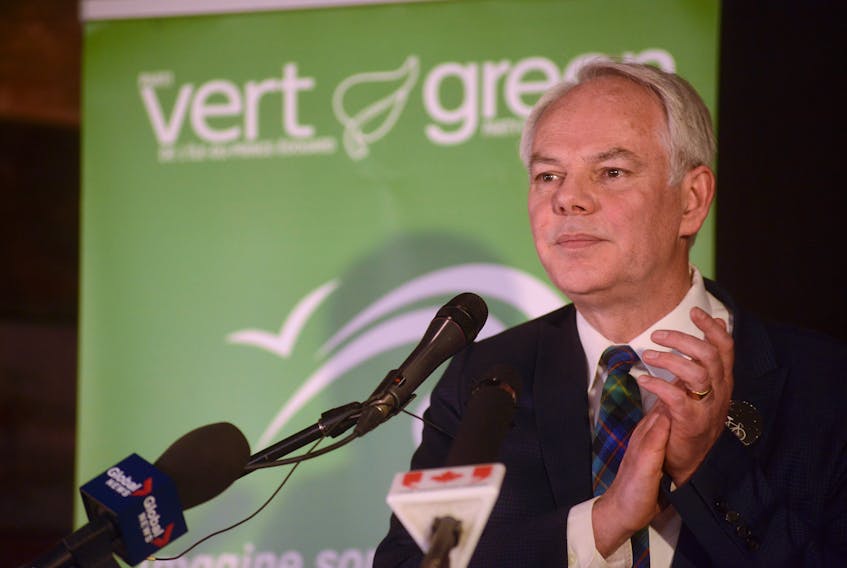Well, so much for the idea of Prince Edward Island ushering in Canada’s first “Green” provincial government. To be honest, it was never really in the cards. But who knows, going forward?
In the meantime, P.E.I. is left with a minority government led by one of the traditional parties — the Progressive Conservatives (winning 12 districts) under the leadership of the little-known leader, Dennis King. Not unexpectedly, the governing Liberals were reduced to a handful of ridings (six), having failed to secure that elusive fourth consecutive term in office.
This was one of those, as they say here, “quiet” provincial elections on P.E.I., even boring by times. Besides an opening day marked by outgoing premier Wade MacLauchlan flinging barbs at the Green Party leader, Peter Bevan-Baker, there was nary a negative word or attack ad to be heard.
If you didn’t know they existed, you could be forgiven for thinking that the parties’ respective platforms were a figment of our imaginations. They just didn’t matter much to Islanders — neither did the tepid debates. And the unusual Easter break and the tragic death of top-flight Green Party candidate, Josh Underhay, only silenced the election campaigns even more.
The central campaign issues were clearly known from the outset: health care and access to mental health services, affordable housing and governance and issue management. It was most assuredly not about job creation, economic growth, wage hikes or pocketbook issues.
This was really an election about change — a powerful desire among the electorate for something different and anything but “politics as usual.” It was about an insatiable appetite for something new and fresh.
But the ballot question itself was framed somewhat differently: can I find sufficient change in a Bevan-Baker-led Green government? Put another way, is the Island’s economic success under MacLauchlan enough? And the answer— as the election results clearly indicated — was a no to both.
In fact, defeated premier MacLauchlan even lost his own seat, after having just secured it in 2015. It was a devastating blow to a proud and hugely successful Islander who began his tenure as premier with such promise. Now his political record and reputation lie in tatters.
Yet voters also showed that they just weren’t ready to fully break with the past. The old way of doing things — that is, putting their trust in the two traditional political parties here — is evidently still hanging on in P.E.I. But if not now for the Greens, then when?
The Greens, led by the friendly rural dentist Bevan-Baker, now hold the balance of power by garnering eight electoral districts (and increase of six). But it must come as a bit of disappointment for a party that has led in the polls provincially for well over two years. Still, two or three more years of political seasoning won’t hurt them one bit.
Of course, it’s difficult to imagine the Greens and the Liberals joining forces to cobble together a stable coalition government — as if it were right out of the proportional representation playbook (ironically, the referendum on electoral reform narrowly failed for the third time). The bad blood between Bevan-Baker and MacLauchlan would make a political marriage of convenience out of the question. But that probably won’t stop the wily Liberals from trying.
It’s also hard to argue convincingly that this P.E.I. election and the performance of the Green Party have any broader political meaning. I doubt very much that this portends anything substantive for the future prospects of Green parties at the national or provincial levels.
The success of the Green Party on P.E.I. is all about Peter Bevan-Baker. He has performed well in the provincial legislature, shown himself to be in command of the various policy files and is widely viewed as very likable. Most importantly, he has connected personally with Island voters and they obviously hold him in high regard. They also see him as honest, well-intentioned and utterly incapable of engaging in corrupt practices.
Even so, the citizens of P.E.I. were not quite ready to give Bevan-Baker the keys to the premier’s 5th floor office in the Shaw Building. But he will be in a position of significant authority in the provincial legislature and thus will need to be taken very seriously. And he will undoubtedly look upon this state of affairs as an opportunity to strengthen his party’s electoral chances at the next election.
Peter McKenna is professor and chair of political science at the University of Prince Edward Island in Charlottetown.









